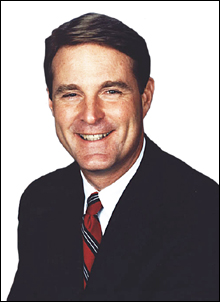 You already know the plot for the 2008 Democratic presidential primaries. According to the conventional wisdom — which, at this point, virtually every pundit and political operative in America seems to buy — it’s going to be a two-person race, with Hillary Clinton squaring off against a candidate to Be Determined. If the Democratic faithful decide, at the last minute, that nominating Clinton would be a fool’s errand, they’ll go running to the Candidate TBD. Otherwise, the general election is Hillary’s to lose.
You already know the plot for the 2008 Democratic presidential primaries. According to the conventional wisdom — which, at this point, virtually every pundit and political operative in America seems to buy — it’s going to be a two-person race, with Hillary Clinton squaring off against a candidate to Be Determined. If the Democratic faithful decide, at the last minute, that nominating Clinton would be a fool’s errand, they’ll go running to the Candidate TBD. Otherwise, the general election is Hillary’s to lose.
Earlier this month, the New York Times Magazine anointed former Virginia governor Mark Warner as the candidate best positioned to play the role of the anti-Hillary. But Evan Bayh, the US senator from Indiana, may be an even better bet.

Like Warner, Bayh is a Democrat who has thrived in a heavily Republican state — an attractive quality, given the Democrats’ pressing need to transcend the Red State–Blue State divide. (In 2004, John Kerry won just 19 states, and it’s been widely noted that 97 of the fastest-growing counties in the US voted for Bush.) But unlike Warner, who won his first and only election in 2000, Bayh can boast several statewide victories: he was elected secretary of state once, governor twice, and senator twice as well, most recently in 2004. In the last election, Bayh invariably tells audiences, he carried Indiana by 24 percentage points — thereby outperforming George W. Bush, who had a 21 percent margin of victory that same year. Granted, Bayh’s lineage may have helped: his father, Birch Bayh, was a long-time US senator from Indiana who ran for president in 1976. But it’s still an impressive track record.
Bayh has other strengths as well. With the Democratic Party desperate to build its credibility on national security — witness the rush to condemn the Dubai ports deal a few weeks back — his experience on the Senate’s intelligence and armed-services committees could be invaluable in a general-election campaign. So, too, could his economic bona fides: as governor of Indiana, Bayh amassed a record of job growth and balanced budgets — without raising taxes! — that Independents and even some Republicans might find appealing. Finally, it must be said that Bayh is a good-looking dude — as the Times’ Matt Bai astutely noted, he’s the spitting image of actor Kevin Kline — and a little aesthetic appeal never hurts in politics.
In sum, Bayh may be just the candidate to help the Democrats retake the presidency two years from now. Before that can happen, however, he’ll need to sell himself to Democratic activists whose early votes in Iowa and New Hampshire will winnow down the field early in 2006. And at this point, whether these voters will dig Bayh’s message of bipartisan conciliation is an open question.
His Standard Stump
As Bayh travels around the country, making his case to the aforementioned Democratic stalwarts, he hits the same points in stump speech after stump speech. First, there’s a dramatic overview of the “great and powerful forces” shaping America’s future: globalization, the aging of the US citizenry, dependence on foreign oil, the rise of China and India. Unfortunately, Bayh continues, given the state of politics today, we aren’t addressing these problems the way we should be. Washington is crippled by “brain-dead gridlock” — here Bayh bangs his fists together softly — by “strident ideology,” by “extreme partisanship that accomplishes nothing.”
Once the picture is sufficiently gloomy, Bayh offers a glimmer of hope. He admits to having a sunny disposition (“I’m by nature an optimist. That’s just the way I’m wired”). And then he explains what this optimism did for Indiana. During his two terms as governor, Bayh brags, the state added more jobs than in any other eight-year period on record — and during his tenure, the Hoosier State had the largest budget surplus in state history. But Bayh didn’t just balance the books. Under his watch, Indiana also launched the 21st Century Scholars program, which guarantees low-income children full college scholarships if, in eighth grade, they sign and then keep a pledge promising to graduate from high school and not use drugs. Since the program started, Bayh says proudly, Indiana’s college-matriculation rate has risen from 40th to ninth in the US.
On to national security, where Democrats have an obligation, as Bayh puts it, to show voters that they can be both “tough and smart.” “Too many Democrats, when the issue of national security comes up, it’s, ‘Oh boy, change the subject,’ ” Bayh told a brunch meeting of the New Hampshire Young Democrats last weekend. “We can’t change the subject, even if we wanted to. Events won’t allow it; the Republicans won’t allow it. We need to take this issue on, and win on an issue that’s a part of their core strategy.” Here’s Bayh’s money line: The truth of the matter is, the Republicans have been one heck of a lot better about national-security politics than they have been about national-security policy. They may have won some elections. But the American people have lost ground.